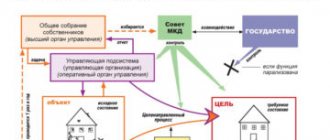The Audit Commission as a control body is elected at the general meeting of HOA members
The Audit Commission (RC), as a control body in the HOA, is elected at the general meeting of members of such a partnership (Part 3 of Article 146 of the Housing Code of the Russian Federation). The term of work of the elected commission members cannot be more than two years. The commission must then be re-elected. At the same time, owners who have already joined the board of the HOA cannot become members of the Republic of Kazakhstan (Part 1 of Article 150 of the Housing Code of the Russian Federation). The elected members of the commission elect the chairman of the Republic of Kazakhstan from among their members.
The general meeting of members is convened and held in accordance with Art. 146 Housing Code of the Russian Federation. Candidates nominated to the audit commission must be given a majority of votes from the total number of votes present at the PSC (Part 4 of Article 146 of the RF Housing Code). As part of the same meeting, members of the HOA can approve the regulations on the work of the Republic of Kazakhstan, including it:
- procedure for electing the commission: numerical composition, terms of office;
- procedure and timing of audits;
- scheme of interaction with the HOA board;
- procedure for drawing up an act based on the results of the audit.
Examples of this provision from working HOAs can be found on the Internet on the websites of partnerships. If the regulations on the work of the audit commission were not adopted at the PSC or, according to the proposed option, the meeting participants voted “against”, then the Republic of Kazakhstan acts in accordance with the provisions of Art. 150 and other articles on the activities of the homeowners’ association of the Residential Complex of the Russian Federation.
How to draw up documents for the general meeting of members of HOAs and residential complexes
131100
Regulations on the Audit Commission of the Partnership
POSITION
on the audit commission of the Agricultural Non-Profit Partnership
"Andriankovo-1"
1. Legal status of the audit commission
1.1. The Audit Commission of SNT "Andriankovo-1" (hereinafter referred to as the "Partnership") is the internal control body over the financial and economic activities of the Partnership, including the activities of the Chairman of the Board, members of the board and the management board.
1.2. The Audit Commission carries out its activities in accordance with the Federal Law “On Non-Profit Organizations” dated January 12, 1996, No. 7-FZ, the Federal Law “On the conduct of gardening by citizens for their own needs and on amendments to certain legislative acts of the Russian Federation” dated July 29 .2017 No. 217-FZ, the Charter of the Partnership, decisions of the general meeting of members of the Partnership (hereinafter referred to as the General Meeting) and these Regulations. The Audit Commission carries out its work on a collegial basis in compliance with the principles of legality, social justice, planning, efficiency, objectivity, and responsibility for the quality of control over the financial and economic activities of the Partnership.
1.3. The Audit Commission is accountable exclusively to the general meeting.
1.4. The Audit Commission is a collegial body and acts on behalf of all members of the commission.
1.5. The Board of the Partnership and the Chairman of the Board of the Partnership are controlled by the Audit Commission in terms of compliance with the legality of their financial and economic transactions. At the request of the audit commission, the chairman, members of the board, as well as all hired employees of the Partnership are obliged to give the necessary explanations orally or in writing.
1.6. The Audit Commission is authorized to carry out audits and inspections of financial and economic activities, both in a planned and unscheduled (extraordinary) manner. The rules for preparing and conducting scheduled and unscheduled audits, as well as other forms of work of the audit commission, are determined by the decisions of the audit commission adopted at its meetings.
1.7. The Audit Commission has the right, on the initiative and with the consent of the majority of the commission members, to conduct an audit of a certain area or the overall financial and economic activities of the Partnership. She is also obliged to perform these actions on the basis of a decision of the general meeting, the board of the Partnership, or at the request of at least one third of the members of the Partnership.
The costs of conducting an inspection carried out at the request of members of the Partnership are borne by those members who requested the inspection, unless the general meeting considers it necessary to make the corresponding expenses at the expense of the Partnership.
1.8. The management of the audit commission is carried out by its chairman, who is elected at the first meeting of the audit commission from among the members of the audit commission.
1.9. The Audit Commission makes decisions within its competence. The decisions of the audit commission are advisory in nature for the controlled executive bodies and the general meeting.
1.10. The activities of members of the audit commission are carried out free of charge, unless otherwise established by a decision of the General Meeting for the term of office of the current audit commission.
1.11. Members of the Audit Commission are responsible for improper performance of duties provided for by the Federal Law, the Charter of the Partnership and these Regulations.
2. Procedure for electing the audit commission
2.1. The Audit Commission of the Partnership is elected from among the members of the Partnership by a general meeting consisting of at least three people who do not have arrears in paying contributions and payments - for a period of two years.
The Chairman of the Board and members of the Board of the Partnership, as well as their spouses, parents, children, grandchildren, brothers and sisters (their spouses) cannot be elected to the Audit Commission.
A member of the audit commission may be an able-bodied individual who is not limited in civil capacity and has the necessary professional knowledge and practical experience. Members of the Audit Commission may be re-elected for another term.
2.2. The decision of the general meeting on the election of members of the audit commission is made separately for each candidate.
2.3. The powers of a member of the audit commission begin from the day of his election at the general meeting and terminate from the moment of expiration of the terms of office, with the exception of cases of early termination of powers provided for by current legislation, the Charter and these Regulations.
3. Early termination of powers of the audit commission
3.1. If there are compelling reasons, members of the audit commission may be recalled from the audit commission early only by decision of the general meeting.
3.2. The issue of early re-election of a member of the Audit Commission may be raised at the request of at least one third of the total number of members of the Partnership.
3.3. The grounds for raising the issue of early termination of the powers of the Audit Commission are:
— improper fulfillment of duties to conduct audits and inspections of financial and economic activities;
— concealment of abuses and violations of financial and economic activities causing losses to the partnership;
— violation of the requirements of the Charter of the partnership, these Regulations.
3.4. The decision to early terminate the powers of the chairman and the entire composition of the audit commission must be motivated and justified.
3.5. The chairman of the audit commission may be released from performing his duties ahead of schedule by a unanimous decision of all members of this body if there are grounds determined by the members of the audit commission. In this case, the chairman of the audit commission, relieved of his duties as chairman of the audit commission, continues to remain a member of the audit commission until the general meeting makes a decision on the early termination of his powers or on the election of a new composition of the audit commission.
4. Competence of the audit commission
4.1. The Audit Commission is obliged to:
— check the implementation by the board of the Partnership, the Chairman of the Board of the Partnership of the decisions of the general meeting, the legality of civil transactions made by the board, the Chairman of the Board of the Partnership, as well as the compliance by the bodies of the Partnership with the requirements of the Charter and regulations governing the activities of the Partnership, the condition of its property;
— carry out audits of the financial and economic activities of the Partnership at least once a year, as well as on the initiative of any member of the audit commission, by decision of the general meeting of members of the Partnership, or at the request of one fifth of the total number of members of the Partnership or one third of the total number of members of the board;
— report on the results of the audit to the general meeting with the presentation of recommendations for eliminating identified violations;
— report to the general meeting on all identified violations in the activities of the management bodies of the Partnership;
— exercise control over the timely consideration by the board of the Partnership and the Chairman of the Board of the applications of the members of the Partnership;
— exercise other powers in accordance with the Charter, Regulations on the Audit Commission of the Partnership and decisions of the general meeting.
4.2. Based on the results of the audit, if a threat is created to the interests of the Partnership and its members, or if abuses by the Chairman of the Partnership or members of the board are identified, the audit commission, within the limits of its powers, has the right to convene an extraordinary general meeting.
4.3. If it is necessary to convene an extraordinary general meeting, the audit commission, as the initiator of its convocation, must send to the board a written reasoned request for convening such a meeting and the timing of its holding. To its request in the form of a decision of a meeting of the commission, signed by its chairman and members who made this decision, the audit commission is obliged to attach an audit report containing information about a threat to the interests of the Partnership and its members or about identifying abuses on the part of the chairman of the Partnership or members of the board.
4.4. If the board refuses to convene an extraordinary general meeting, the audit commission has the right to appeal such a decision in court.
5. Basic principles of the commission’s work
5.1. The Audit Commission resolves all the main issues of its competence in the interests of fulfilling tasks arising from:
— mandatory norms of current legislation;
— the rights and obligations of the audit commission set out in Federal Law No. 217-FZ, the Charter of the Partnership and these Regulations;
— decisions of General Meetings;
— results of audits and inspections of the financial and economic activities of the Partnership.
5.2. All members of the commission take part in conducting audits and inspections, distributing control areas among themselves.
5.3. The Audit Commission makes decisions only after a collegial discussion of the results of audits and inspections, qualifying discovered deficiencies and violations in accordance with the law.
5.4. The Audit Commission is obliged to protect the rights and legitimate interests of the Partnership and its members, established and guaranteed by Russian legislation.
5.5. An audit of the financial and economic activities of the Partnership is carried out at least once a year.
5.6. By decision of the general meeting, on its own initiative or at the request of other initiators of extraordinary audits and inspections, the audit commission, no later than three days, makes an appropriate decision, brings it to the board of the Partnership and, with the assistance of this body, begins to conduct an audit.
5.7. The Audit Commission carries out audits and inspections within the time limits established by it and to the required extent. Operational audit plans are developed and approved by the audit commission independently
5.8. If it is necessary to collect information, the commission has the right to demand from officials and other persons subject to control not only oral, but also written explanations on the violations or abuses it has identified in financial and economic activities.
6. Procedure for holding commission meetings
6.1. The Audit Commission carries out its activities in the form of meetings, preparation and conduct of scheduled and unscheduled audits, as well as in other forms determined by the Audit Commission. Meetings of the Audit Commission are held as necessary, but not less than once a year.
6.2. Meetings of the audit commission are held in accordance with the meeting schedule approved by the chairman of the audit commission.
If emergency circumstances arise, the chairman of the audit commission or any of its members has the right to convene a meeting of this body at any time.
6.3. At meetings of the audit commission, issues proposed by the chairman of the audit commission, the general meeting, the board or any member of the audit commission are considered.
6.4. The preparation and organization of the meeting of the audit commission is ensured by its chairman.
6.5. A meeting of the audit commission is valid if at least two thirds of the elected members of the audit commission are present, and each member of the audit commission must be properly notified of the time and place of the meeting.
6.6. Meetings of the audit commission are opened and chaired by its chairman. He informs the commission members about the agenda of the meeting, the grounds and reasons for including the proposed issues in it.
6.7. At a meeting of the commission, other issues may be included on the agenda if more than 50% of its members present at this meeting vote for them.
6.8. The agenda of the commission's meetings must include issues whose consideration cannot be delayed, in accordance with the decision of the general meeting or the requirement of the initiators of the extraordinary audit.
6.9. Members of the board, representatives of initiative groups of members of the Partnership who demanded an extraordinary audit or inspection, as well as invited persons may be present at meetings of the audit commission with the right to an advisory vote.
6.10. Minutes of the meeting of the audit commission are kept at each meeting. The responsibility to organize the keeping of minutes rests with the chairman of the audit commission. The minutes of the meeting of the audit commission must contain information determined at the opening of the meeting.
6.11. The minutes of the meeting of the audit commission must be duly drawn up within 7 (seven) working days after the meeting is closed in 2 copies.
All copies of the minutes are signed by the chairman of the audit commission and all its members present at the meeting and certified with the round seal of the Partnership.
6.12. The minutes of meetings of the audit commission are filed in the folder of minutes of meetings of this body. Copies of the minutes of meetings of the Audit Commission of the Partnership, certified extracts from these minutes, are presented for review to members of the Partnership and persons engaged in gardening on the territory of the Partnership on an individual basis, at their request, as well as to the local government body on whose territory the Partnership is located, government authorities of the subject Russian Federation, judicial and law enforcement agencies, organizations in accordance with their requests in writing.
7. The procedure for making a decision by the commission
7.1. The Audit Commission makes decisions based on the powers it has in accordance with current legislation and the Charter of the Partnership.
7.2. Decision-making should be preceded by study and collegial discussion of information obtained during the audit, verification or comprehensive audit.
7.3. Decisions of the audit commission are made by open voting by a simple majority of votes of the commission members present at the meeting. In case of equality of votes, the vote of the chairman of the commission is decisive. All decisions of the audit commission are documented in the minutes of the meeting at which the relevant decisions were made.
7.4. The decisions of the commission on the results of the audit or inspection are accompanied by relevant acts and/or certificates, which must contain the commission’s proposals to eliminate the discovered violations and shortcomings in financial and economic activities.
7.5. Extracts from the minutes of meetings of the audit commission, copies of certificates of inspections and audit reports are submitted to the board of the Partnership. They can also be presented to local authorities upon their written requests or on the initiative of the audit commission.
8. Types of control functions of the commission
8.1. The Audit Commission carries out its control functions in the form of audits and inspections. It is also possible to combine these two types of control over financial, economic and organizational activities.
8.2. The commission carries out audits of:
— financial and economic activities of the Partnership;
— the legality of civil transactions carried out by the executive bodies of the Partnership.
8.3. During the inspections, the following are checked:
— implementation by the board of decisions of general meetings and its own decisions in the field of financial and economic activities;
— consideration by the board, chairman of the Partnership of applications, complaints and proposals of members of the Partnership.
8.4. Based on the results of audits, the commission draws up acts, and based on the results of inspections, certificates.
9. The procedure for carrying out audits and inspections
9.1. All documents on the receipt of funds and their expenditure in the Partnership are subject to audit.
9.2. The Audit Commission is obliged to check the following aspects of financial activities:
— correct accounting and storage of the Partnership’s funds;
— progress and results of execution of the income and expense estimate;
— correctness of acceptance of membership, targeted and other contributions;
— timely payment of contributions by members of the Partnership and correct collection of late fees;
— correct collection and timely submission of taxes and other payments;
— the correctness of the issuance and expenditure of funds for the economic and other needs of the Partnership, including the availability and compliance of permits and supporting documents (contracts and labor agreements, estimates for large construction and installation works, work acceptance certificates, advance reports, etc. );
— the correctness of the issuance of wages and bonuses to persons working in the Partnership under employment contracts;
— the correctness of material incentives for members of the board, members of control bodies and other persons;
— the correctness of maintaining strict reporting documents, including the cash book, pay slips, receipt and expenditure orders, check books, etc.;
— timeliness and accuracy of the accountant’s monthly, quarterly and annual reports.
9.3. In the process of auditing the economic activities of the Partnership, the commission is obliged to check the following:
— the presence and condition of the Partnership’s property with a separate indication of the property that is the property of the Partnership as a legal entity, and the property that is the common joint property of the members of the Partnership, acquired or created with targeted contributions;
— the correctness of the inventory of property and the write-off of lost, obsolete and unusable property;
— the legality of civil transactions concluded by the board of the Partnership, and the results of their implementation;
— the competence of the decisions and orders adopted by the board and the chairman of the Partnership, the legality of the provisions and instructions approved by them;
9.4. The results of the audit of financial and economic activities specified in clauses 9.2 and 9.3 are reflected by the audit commission in the audit report.
9.5. Verification of the implementation by the board of the Partnership of decisions of general meetings and decisions of the board is carried out by the audit commission by comparing specific decisions with the measures taken in pursuance of them and the specific results achieved in the field of social, economic and other activities.
9.6. Verification of the timeliness and objectivity of the consideration by the board, the Chairman of the Board of the Partnership of applications, complaints and proposals of members of the Partnership is carried out by analyzing the information contained in the log of applications of members of the Partnership, submitted in writing, as well as by interviewing complainants and applications.
The commission is obliged to pay special attention to the presence and correctness of keeping a log of applications, to the timeliness and correctness of consideration of applications on the merits.
9.7. If an unfavorable state of affairs is detected with the implementation of decisions of general meetings and the board or with the consideration of applications from members of the Partnership, the audit commission in the relevant certificates must set out its proposals on ways and means of eliminating the identified shortcomings and violations.
10. Interaction of the audit commission with the board of the Partnership
10.1. In the process of conducting audits and inspections, the audit commission and the board of the Partnership closely interact with each other. The board must assist the audit commission in its work.
10.2. When assigning an audit or inspection, the following procedure must be followed:
— the chairman of the audit commission informs the Chairman of the Board of the Partnership and the accountant of the Partnership about the decision of the audit commission to conduct an audit of the financial and economic activities within the time frame prescribed by it and in the established volume and makes a demand for the provision of the necessary documents to the commission, as well as the presentation of monetary and other funds of the Partnership;
— The chairman of the board and the accountant of the Partnership are obliged to submit the required documents to the audit commission as soon as possible, as well as present cash and other material resources, and not create any obstacles to the members of the commission in their work.
10.3. The Audit Commission reports the results of its audits to the general meeting. The Board of the Partnership, the Chairman of the Board of the Partnership, has the right to familiarize itself with the results of inspections before discussing them at the general meeting of the Partnership. The Audit Commission does not have the right to submit the results of inspections for discussion at the general meeting without familiarizing the chairman and members of the board with them.
10.4. The Audit Commission does not have the right to report to the general meeting on identified violations if they were eliminated before the general meeting.
11. Consideration of audit reports and certificates of the commission by the general meeting
11.1. The General Meeting approves the reports of the Audit Commission, which are a statement of the results of the audits and/or inspections carried out, accompanied by an audit report and a certificate of inspection, or a combined document with the necessary attachments. The approved report (combined document) is attached as an Appendix to the Minutes of the general meeting of members of the Partnership.
11.2. If the audit commission identifies serious violations and abuses, the general meeting, along with approving the commission’s report, may decide to bring the violators to disciplinary, material, administrative or criminal liability in accordance with the law.
Chairman of the Board
SNT "Andriankovo-1" Andreev M.M.
The Audit Commission controls the financial activities of the HOA
The Audit Commission monitors that the financial and economic activities of the HOA and the use of resources occur in accordance with budgets and annual plans, and that financial transactions are justified.
The responsibilities of the members of the audit commission are set out in Part 2 of Art. 150 Housing Code of the Russian Federation. They can also be enshrined in the regulations on the Republic of Kazakhstan. As part of its control activities, the commission must:
- Check the financial performance of the HOA at least once a year.
- Audit the annual financial statements, prepared estimates of income and expenses of the partnership, the amount of contributions, reporting of the HOA, and then submit conclusions to the PSC.
- Report on your work to the general meeting of HOA members.
The Republic of Kazakhstan should check not the accounting in the HOA, but all the financial activities of the partnership, and there must be systematic control over the work of the HOA.
How to change the composition of common property in a house managed by a housing cooperative
98111
4. Powers, rights and responsibilities of the audit commission
4.1. The following issues fall within the competence of the Company's Audit Commission:
— verification of the Company’s financial documentation, conclusions of the property inventory commission, comparison of these documents with primary accounting data;
— checking the legality of contracts concluded on behalf of the Company, transactions made, and settlements with counterparties;
— analysis of compliance of accounting and statistical records with existing regulations;
— checking compliance in the financial, economic and production activities of the Company with established standards, rules, GOSTs;
— analysis of the financial position of the Company, its solvency, liquidity of assets, the ratio of equity and borrowed funds, identifying reserves for improving the economic condition of the Company and developing recommendations for its management bodies;
— checking the correctness of the Company’s balance sheets and reporting documentation;
— checking the competence of decisions taken by the Company’s management body, their compliance with the Company’s Charter and decisions of general meetings.
4.2. The Audit Commission of the Company carries out regular inspections (audits) of the financial and economic activities and current documentation of the Company at least once a year, as well as at any time on its own initiative, by decision of the General Meeting of Participants of the Company.
4.3. In the course of performing the functions assigned to the Audit Commission of the Company, the commission may involve experts from among persons who do not hold positions in the Company. The Chairman of the Company's Audit Commission is responsible for the actions of the involved specialists.
4.4. The Audit Commission of the Company has the right:
— demand from persons holding positions in the Company’s management bodies the necessary explanations on issues arising during inspections and audits, orally or in writing;
— receive and get acquainted with documents on the financial and economic activities of the Company;
— demand the convening of an extraordinary General Meeting of the Company’s participants, including based on the results of an inspection if a threat to the interests of the Company arises or abuse of officials is identified, as well as when identified violations require a decision to be made on issues within the competence of the specified management bodies of the Company.
4.5. Officials of the Company are obliged to provide the Audit Commission of the Company with the required documents on the financial and economic activities of the Company no later than [meaning] days after the commission makes an oral or written request.
4.6. The Audit Commission of the Company is obliged to:
— carry out timely and complete checks (audits) of the financial and economic activities of the Company;
— timely and conscientiously study all documents and materials related to the subject of the inspection;
— assess the reliability of the data contained in reports and other financial documents of the Company;
- based on the results of inspections (audits), in all cases, draw up certificates (acts, conclusions), including conclusions and proposals for correcting identified deficiencies;
— demand from the relevant management bodies of the Company to eliminate the identified violations;
— maintain commercial secrets;
— not to disclose confidential information to which members of the Company’s Audit Commission have access when performing their functions;
— timely bring to the attention of the General Meeting of Members of the Company the results of inspections (audits) carried out in the form of a conclusion.
4.7. Based on the results of the audit of the financial and economic activities of the Company, the Audit Commission of the Company draws up a conclusion, which is approved at its meeting. The conclusion is signed by the chairman of the Audit Commission of the Company who took part in the audit and submitted to the relevant management bodies of the Company.
4.8. The conclusion drawn up by the Audit Commission of the Company must contain information about:
— reliability of the Company’s financial statements;
— facts of violation of the procedure for maintaining accounting records and presenting financial statements established by legal acts of the Russian Federation, as well as legal acts of the Russian Federation and internal documents of the Company when carrying out financial and economic activities;
— other information determined by the current legislation of the Russian Federation.
4.9. The Audit Commission of the Company submits, no later than [value] days before the annual General Meeting of Members of the Company, a conclusion based on the results of the audit of the financial and economic activities of the Company for the year.
back to contents
For verification, the audit commission requests the necessary documents from the HOA board
Let's consider the work of the Republic of Kazakhstan when checking the financial statements of the HOA for the past year. The chairman of the board of the partnership, by order of the entire board of the HOA, is obliged to transfer documents to the members of the audit commission/auditor for verification.
The Audit Commission has the right to request from the HOA board all documents necessary to verify the reporting, including:
- constituent documents of the partnership,
- agreements with contractors and agreements for the provision for use of common property of owners of premises in apartment buildings,
- agreements with RSO,
- minutes of OSS and OSCh, HOA board meetings,
- estimates of income and expenses and a report on its implementation,
- documents on settlements with suppliers,
- documents on labor costs,
- bank and cash documents,
- information about charges for housing and communal services,
- journals of inspections of general property and seasonal inspections,
- register of ODPU testimony, etc.
At the commission meeting, before the inspection, an audit program is drawn up and adopted, which must contain all the issues that the Republic of Kazakhstan is going to check. The Republic of Kazakhstan checks the legality and correctness of expenses, the correspondence of expenses to the actual work performed and the services provided, the reliability of the information specified in the documents and reporting.
After the inspection, the audit commission is obliged to draw up minutes of the meeting and an inspection report/conclusion. The conclusion is submitted to the general meeting of HOA members. It is the OSCh that confirms the conclusion made.
At the same time, at the legislative level, the consequences of a negative decision of the PSC of the partnership, which was submitted for approval by the audit commission, are not specified. The procedure for action in such a situation can be prescribed in the regulations on the work of the Republic of Kazakhstan and approved at the PSD in advance.
What documents must the HOA provide at the owner’s request?
616320
Rights of a housing cooperative auditor
At the level of Russian legislation, the auditor has the right to audit the activities of the cooperative, which is of a financial and economic nature. To ensure such a right, members of the Republic of Kazakhstan are provided with free access to all documents that relate to the activities of the organization.
Paragraph 4 of Article 120 establishes a minimum set of rights of the auditor, which can be defined in the statute of the organization in an expanded form, and from which the responsibilities of other members of the organization flow. As a result, officials of a housing cooperative have an obligation to provide, at the request of the Republic of Kazakhstan, documentation that reflects the financial and economic activities of the organization. In case of refusal to comply with the requirements of the auditor, the relevant person may be held accountable in accordance with the labor legislation of Russia.
When performing its functions, the audit commission has the right:
- carry out a review of any financial documentation and conclusions that were prepared by the audit commission for the inventory of property;
- reconcile the data contained in these documents with the data in the primary accounting documentation;
- check the cash register and property of the housing cooperative;
- study the minutes of meetings of any bodies of the structure;
- initiate an extraordinary general meeting of members, etc.
On a note
There should be an audit commission in every homeowners association. Its competence includes control over the financial and economic activities of the HOA: how correctly and justifiably the partnership spends incoming contributions and fees for housing and communal services.
The commission is elected at the general meeting of the HOA members, and it is the PSC that controls the work of the RC, accepts its reports and approves the regulations on the work of the commission.
The Audit Commission conducts scheduled and unscheduled inspections of the activities of the HOA and, based on the results of the work, draws up a conclusion, which should outline conclusions about whether there are violations in the work of the partnership and what measures need to be taken to eliminate the identified errors.






